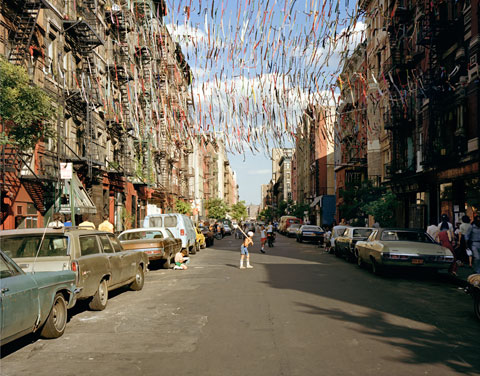
East 4th Street between Second and Third Avenues, 1980 (4×5 film)
© Brian Rose/Ed Fausty
When I first arrived in New York in the summer of 1977–the day of the blackout–I got off the train early, picked up a copy of the Village Voice, perused the classifieds for available apartments, and by noon, had scored a sublet in a rundown tenement on East 4th Street between Second and Third Avenues.
I lived there for about 15 years before moving to Stanton Street, five blocks south, and before my back and forth life between Amsterdam and New York. Working out of that tiny apartment on 4th Street with bathtub in the kitchen and toilet in the hall, I did photographs of the Lower East Side, New York City parks, began my long-term documentation of the Iron Curtain and Berlin, and wrote many of my best songs. Suzanne Vega crashed on my couch a number of times, and one day came by to audition her new song “The Queen of the Soldier” for me. The first Fast Folk magazine inserts were pasted up in my apartment and typed out on a borrowed IBM Selectric.
I met my wife, Renée Schoonbeek, on the block as well. She and her friend Josja van der Veer came from the Netherlands as students to do research on New York housing, and they interned with the Cooper Square Committee, a housing advocacy group that I served on the steering committe of, and briefly chaired. We met in front of Cooper Square’s office just to the left of the photograph above. Together we helped establish the Cooper Square MHA, which continues to maintain affordable housing in more than two dozen buildings in the neighborhood.
Last night, Cooper Square celebrated its 50th anniversary and honored Frances Goldin, co-founder of the organization, literary agent, and a Lower East Side treasure. At times fiery and uncompromising, but at critical moments practical and savvy, she inspired us to fight for low income housing in the face of overwhelming odds. Although most people know her primarily as a firebrand, she led one of the most effective community planning efforts in the city, perhaps in the United States–one that scholars will study for years.
The tenements of 4th Street were renovated one by one, shuffling residents around but displacing no one, and the many theaters and other cultural institutions have formed a cultural district called Fourth Arts Block. The historic streetscape was preserved, and the people–a glorious crazy melting pot of folks–remain here to stay. This week the Village Voice named it the Best City Block, ” a veritable People’s Republic of East 4th Street–right here in Bloomberg Town!”
Ever recall a skinny guy with a White English Bull Terrier (lived across La Mama circa '80-'83)?
No, don't believe I do.